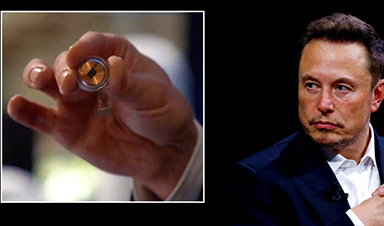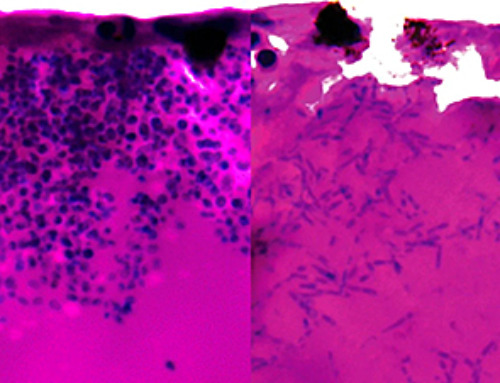Elon Musk has claimed the first human patient implanted with his wireless Neuralink brain chip can move a computer cursor 'just by thinking'.
'Progress is good, and the patient seems to have made a full recovery, with neural effects that we are aware of,' Musk said in a Spaces event X.
'Patient is able to move a mouse around the screen by just thinking.'
Musk said Neuralink, a company working to develop a brain-computer interface (BCI) that can be poked into human brains, is now trying to get as many mouse button clicks as possible from the patient.
Neuralink wedged its first product, called Telepathy, in a person last month.
Musk, the billionaire chief executive of Tesla and SpaceX, said Telepathy's initial users will be those with paralysis.
The dream, Musk says, is to help make phone and computer control possible outside of a lab setting. (Similar earlier tests have involved people being connected to a computer with a cord.)
It's hoped users will be able to control electronic devices 'just by thinking'.
The company does not have approval from the US Food and Drug Administration to sell the device but was given the green light for human trials after officials evaluated its safety risks.
Volunteers for the first human clinical trials are 'open', Neuralink says, for people with limited or no use of both hands due to a cervical spine injury or a neurological disorder that affects nerve cells called neurological disorder that affects nerve cells
'This study involves placing a small, cosmetically invisible implant in a part of the brain that plans movements,' Neuralink's website reads.
'The device is designed to interpret a person's neural activity, so they can operate a computer or smartphone by simply intending to move – no wires or physical movement are required.'
Subjects in the company's PRIME study - short for Precise Robotically Implanted Brain-Computer Interface – have a coin-sized chip surgically inserted by a robot in a part of the brain that controls movement intention.
The tiny computer, called N1, contains 64 flexible polymer threads that provide 1,024 sites for recording brain activity.
Experts say that the technology is still rather far off and won't be on the market for a good few years.
Neuralink may also have to slow down a bit, Dr Mhairi Aitken, an ethics research fellow at The Alan Turing Institute, told Metro.co.uk.
'The advances with Neuralink are worrying in that they appear to be moving forward at a rapid pace without a great deal of transparency and without the usual scientific oversight,' he said.
'AI offers great potential in assistive technologies for people with disabilities but it needs to be developed responsibly and cautiously.
'The vision that this technology will enable people in the future to connect with machines and communicate with AI, drives a type of innovation that risks making humans more machine-like rather than focussing on creating AI to support and help humans in their lives today.'
Long-term studies are needed to ensure the devices are safe and ethical, with worries of the immediate impact of the device – think strokes and vasculature damage – being the ones to watch.
Neuralink's study brochure says that volunteers will be followed for five years.
How transparent the study is has also come under fire. It's nowhere to be found on ClinicalTrials.gov, the US National Institutes of Health's online registry.
In 2022, animal rights groups alleged Neuralink 'mutilated monkey brains', while the Physicians Committee for Responsible Medicine non-profit accused it of conducting 'invasive and deadly' experiments on primates.
With all these worries, doubts and criticisms, Musk showing off the chip's computer cursor-wiggling powers isn't a surprising one, says Dr Andrew Jackson, a professor of neural interfaces at Newcastle University's Biosciences Institute.
'What we don't know is whether their BCI, is performing better than previous technologies that have been used to do this kind of thing, and that would require seeing their data and ideally publishing results from their studies,' he told Metro.co.uk.
'But it sounds plausible and a sensible thing that they would want to show having implanted the device.'
News
Scientists Unlock a New Way to Hear the Brain’s Hidden Language
Scientists can finally hear the brain’s quietest messages—unlocking the hidden code behind how neurons think, decide, and remember. Scientists have created a new protein that can capture the incoming chemical signals received by brain [...]
Does being infected or vaccinated first influence COVID-19 immunity?
A new study analyzing the immune response to COVID-19 in a Catalan cohort of health workers sheds light on an important question: does it matter whether a person was first infected or first vaccinated? [...]
We May Never Know if AI Is Conscious, Says Cambridge Philosopher
As claims about conscious AI grow louder, a Cambridge philosopher argues that we lack the evidence to know whether machines can truly be conscious, let alone morally significant. A philosopher at the University of [...]
AI Helped Scientists Stop a Virus With One Tiny Change
Using AI, researchers identified one tiny molecular interaction that viruses need to infect cells. Disrupting it stopped the virus before infection could begin. Washington State University scientists have uncovered a method to interfere with a key [...]
Deadly Hospital Fungus May Finally Have a Weakness
A deadly, drug-resistant hospital fungus may finally have a weakness—and scientists think they’ve found it. Researchers have identified a genetic process that could open the door to new treatments for a dangerous fungal infection [...]
Fever-Proof Bird Flu Variant Could Fuel the Next Pandemic
Bird flu viruses present a significant risk to humans because they can continue replicating at temperatures higher than a typical fever. Fever is one of the body’s main tools for slowing or stopping viral [...]
What could the future of nanoscience look like?
Society has a lot to thank for nanoscience. From improved health monitoring to reducing the size of electronics, scientists’ ability to delve deeper and better understand chemistry at the nanoscale has opened up numerous [...]
Scientists Melt Cancer’s Hidden “Power Hubs” and Stop Tumor Growth
Researchers discovered that in a rare kidney cancer, RNA builds droplet-like hubs that act as growth control centers inside tumor cells. By engineering a molecular switch to dissolve these hubs, they were able to halt cancer [...]
Platelet-inspired nanoparticles could improve treatment of inflammatory diseases
Scientists have developed platelet-inspired nanoparticles that deliver anti-inflammatory drugs directly to brain-computer interface implants, doubling their effectiveness. Scientists have found a way to improve the performance of brain-computer interface (BCI) electrodes by delivering anti-inflammatory drugs directly [...]
After 150 years, a new chapter in cancer therapy is finally beginning
For decades, researchers have been looking for ways to destroy cancer cells in a targeted manner without further weakening the body. But for many patients whose immune system is severely impaired by chemotherapy or radiation, [...]
Older chemical libraries show promise for fighting resistant strains of COVID-19 virus
SARS‑CoV‑2, the virus that causes COVID-19, continues to mutate, with some newer strains becoming less responsive to current antiviral treatments like Paxlovid. Now, University of California San Diego scientists and an international team of [...]
Lower doses of immunotherapy for skin cancer give better results, study suggests
According to a new study, lower doses of approved immunotherapy for malignant melanoma can give better results against tumors, while reducing side effects. This is reported by researchers at Karolinska Institutet in the Journal of the National [...]
Researchers highlight five pathways through which microplastics can harm the brain
Microplastics could be fueling neurodegenerative diseases like Alzheimer's and Parkinson's, with a new study highlighting five ways microplastics can trigger inflammation and damage in the brain. More than 57 million people live with dementia, [...]
Tiny Metal Nanodots Obliterate Cancer Cells While Largely Sparing Healthy Tissue
Scientists have developed tiny metal-oxide particles that push cancer cells past their stress limits while sparing healthy tissue. An international team led by RMIT University has developed tiny particles called nanodots, crafted from a metallic compound, [...]
Gold Nanoclusters Could Supercharge Quantum Computers
Researchers found that gold “super atoms” can behave like the atoms in top-tier quantum systems—only far easier to scale. These tiny clusters can be customized at the molecular level, offering a powerful, tunable foundation [...]
A single shot of HPV vaccine may be enough to fight cervical cancer, study finds
WASHINGTON -- A single HPV vaccination appears just as effective as two doses at preventing the viral infection that causes cervical cancer, researchers reported Wednesday. HPV, or human papillomavirus, is very common and spread [...]
























